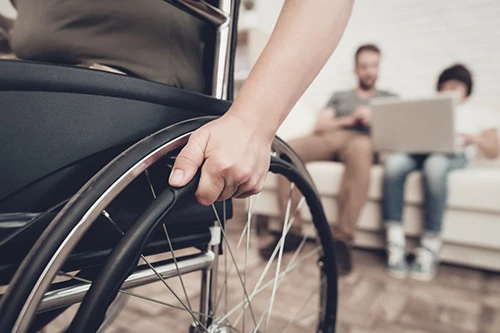Tis the season for grilling, tanning, and splashing. The sun may be bearing down on people – it’s not uncommon for temperatures in Delray Beach to be in the high 80s to low 90s at this time of year – but the heat also leaves the opportunity of finding relief in a cool, refreshing pool. But while it may be a fun time to splash around with foam pool noodles and pool rings, swimming accidents can and do occur.
According to the US Consumer Product Safety Commission’s 2018 report, “Pool or Spa Submersion: Estimated Nonfatal Drowning Injuries and Reported Drownings”, an estimated 6,400 pool- or spa-related nonfatal drowning injuries were treated by hospital emergency departments each year between 2015 and 2017, with most of these injuries having occurred in pools. So this begs the question, “When an injury occurs, who is held liable?”
What constitutes a pool-related injury?
Drowning isn’t the only injury to happen in pool areas. Consider the following types of injuries that occur at the swimming pool:
- Slip and fall injuries on the deck, grass, etc.
- Injuries to limbs (broken bones)
- Concussions
- Diving board and slide injuries
- Drowning
- Pool-related illnesses
Causes of pool accidents
There are quite a few issues that could potentially lead to pool accidents:
Slippery decks, grass, or concrete. Slippery surfaces surrounding pools are common – algae may be growing or water is splashed onto the surface – and they often lead to slip and fall accidents, leaving the pool’s owner liable for property negligence.
Lack of supervision. Unattended children often tumble into pools – it takes just a few moments of looking away. Worse is that it takes just five minutes to drown.
Roughhousing. If there are kids at a pool, then roughhousing is guaranteed. Where there is roughhousing, however, there are multiple injuries just waiting to happen. For instance, a child could dunk another child, thinking it would be fun. However, he would be unaware that dunking a child for too long would risk drowning.
Under the influence. When a swimmer is under the influence of alcohol and drugs, they are at risk of various pool injuries, some of them life-changing. While a swimmer under the influence may feel a surge of confidence and invincibility, what really happens is impairment of not only judgment but also of reaction times.
Poorly maintained pool. Without properly cleaning the pool, the pool water could become home to dangerous entities, including E. coli 0157:H7, salmonella, cryptosporidium parasites, giardia parasite, norovirus, and shigella.
Preventing accidents
Incidents can be minimized by ensuring the following:
Following a list of pool rules. These rules are often plastered onto metal or stained wood. These rules should include no running around, no horseplay, maintaining attentiveness, etc.
Have a basic knowledge of swimming. If people are going to be near the pool, whether it’s on the poolside or the shallow end of the pool, they should also have the basic knowledge of swimming.
An adult must always be available to supervise. At least one adult supervisor should always be on post. Lifeguard certification is a major plus.
Avoid drinking a lot of alcohol. Better yet, if possible, avoid any alcohol.
Ensure that at least one adult in the vicinity has a CPR certification or at least knowledge of CPR. CPR can be absolutely life-saving. While several studies have revealed that there is a poor outlook of survival in drowned children with cardiac arrest (Resuscitation Journal, 2019), especially when resuscitation’s duration is longer than 25 minutes, performing effective CPR within the first few minutes can save all lives and significantly reduce the risk of brain damage (CPR Certification HQ).
Properly check all equipment for issues. Ensure that floaties, pool noodles, tubes, and other items are in a safe area if they are not being used. Check the condition of diving boards, slides, etc. often. If you’re the residential pool owner, stain the decks whenever needed and inspect the pool for any tears to the lining and/or other damages.
Ensure that the pool has been cleaned often. If you need to, speak with the owner or pool management to see if they’ve taken the necessary steps to prevent water-borne illnesses. Find out how often they’ve vacuumed the pool – is it once or twice a week? Or less? Also see if they skim the pool daily and use chlorine tablets (chlorine tablets should be used when the pH balance is not between 7.2 and 7.8).
Have adequate survival equipment. The pool’s owner should have on hand: first aid kits, life jackets, spine boards and/or body hooks, a swimming pool rescue, and swimming pool safety rings. Additionally, they should also install swimming pool alarms, fences/other barriers, and swimming pool ladders/ramps. If you can, bring your own first aid kit, floaties and life jacket, just in case.
Who is liable when a swimming injury occurs?
According to Residential Swimming Pool Safety Act, established by the Florida Legislature in 2000, to pass a swimming pool inspection, a new residential pool must incorporate at least one of the following:
- A pool barrier – at least four feet high with plenty of space between the water and the barrier – needs to be erected.
- A pool alarm with surface sensors.
- A certified safety cover.
- An exit alarm and self-closing/latching device for every door that leads to the pool’s area.
Otherwise, if a child encounters a pool accident, the owner of the residential area may be held liable.
For public/commercial pools, the owners could be held liable if:
- There are no barriers or the barriers in place do not meet specifications required.
- A vacuum safety release that ceases operation or reverses/releases the suction when there is a blockage.
- A child slips and falls on a deck that is not slip-resistant and not four feet wide.
- There aren’t multiple ladders, steps, ramps, etc.
- There isn’t a storage room that cannot be accessed by others.
Additionally, if a trespasser is injured from a pool incident, the property owner does not have to provide anything beyond basic care, since the owner did not intentionally harm the trespasser.
However, you could be held liable if you have been neglecting your safety, the safety of a child/children, or the safety of others, despite the measures the pool owners have taken. This could include not following pool rules, drinking, running around, pushing others into the pull, and not keeping an eye on your children.
Attractive Nuisance
Keep in mind that, if you have children, you must take extra precautions to prevent them from entering the pool’s vicinity without supervision. However, know that owners can be held liable no matter the case under the Attractive Nuisance clause. Pools are deemed an attractive nuisance – an object that piques the curiosity of a child – and so if a minor is harmed, the property owner will be held liable, regardless of the circumstances surrounding the accident.
In terms of trespassing, if a child enters the residence’s pool area and is injured near or in the pool, the pool’s owner will be held responsible.
Reduce the risk of accidents, for everyone’s sake!
To avoid any neglectful swimming-related incidents, pool owners should take notice of the causes of pool injuries – slip and falls, concussions, drowning, etc. – and prevent them by maintaining the pool and its surroundings, avoiding alcohol, learning basic swimming techniques, providing a list of safety rules, obtain CPR training, having survival equipment on hand and installing barriers and alarms.
However, as a swimmer, you should consider your role on the poolside. Avoid drinking (but if you must drink, indulge only a little), take a swimming course if you are lacking basic swimming skills, bring your own protective/survival equipment such as life jackets, especially if you have children. Furthermore, if there are children hanging in the pool area, make sure that there is supervision.
While a swimming pool is always deemed a little risky for swimmers and pool owners, it’s always worth it when facing the blazing sun.

